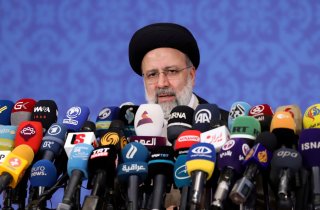In First Presidential Call, Raisi and Macron Talk Iran Deal
Can Macron save the JCPOA?
On Monday, newly inaugurated Iranian President Ebrahim Raisi held a call with French President Emmanuel Macron. The two leaders discussed the ongoing nuclear negotiations in Vienna, intended to return Iran and the United States to the 2015 Joint Comprehensive Plan of Action (JCPOA) nuclear deal, in addition to other topics of mutual interest.
The Iranian state-run IRNA news agency reported that Raisi told Macron that the United States and the European Union were obliged to implement their commitments under the 2015 agreement, in spite of American and Iranian deviations from the rules it established. Under President Francois Hollande, France was one of the six nations composing the P5+1 that negotiated the agreement, alongside the United States, Britain, Germany, Russia, and China. Following the Trump administration’s withdrawal from the deal, France played a key role as an intermediary, helping to keep it mostly intact despite President Donald Trump’s increasing sanctions.
Following President Joe Biden’s accession to the White House, American, European and Iranian diplomats opened negotiations in Vienna, discussing a return to the 2015 agreement. The Vienna talks adjourned in June without reaching an agreement, and no date has been set to resume them.
In the phone call, Raisi underscored that “in any negotiation, the rights of the Iranian nation should be secured and guaranteed”—an implicit criticism of the Trump administration from withdrawing from what Iran perceived as a U.S. commitment to it.
Macron urged Raisi to resume the talks as quickly as possible and cease Iran’s activities, such as high-level enrichment, that violated the agreement. The two leaders also discussed events in Lebanon, a former French colony that maintains a close relationship with Paris but is also heavily influenced by Iran through Tehran’s patronage of the Hezbollah militant group. The country recently marked the one-year anniversary of the Beirut harbor explosion, which destroyed much of the capital city; Raisi thanked Macron for providing financial aid to Lebanon in the aftermath.
Raisi took office on Thursday, August 5, in a ceremony attended by dignitaries from more than seventy countries. In his inauguration speech, the 60-year-old cleric emphasized that Iran had a right to sovereignty and nuclear development, and would not bow to pressure from foreign sanctions. However, Raisi also claimed that Iran’s nuclear program would remain peaceful, and that the nation would continue the previous administration’s negotiations to return to the nuclear agreement.
A representative from the European Union attended Raisi’s inauguration, provoking protests from human rights groups.
Trevor Filseth is a current and foreign affairs writer for The National Interest.
Image: Reuters

